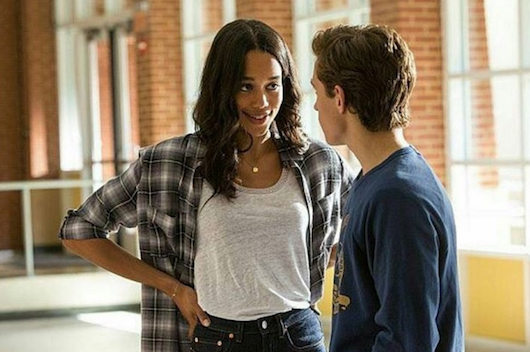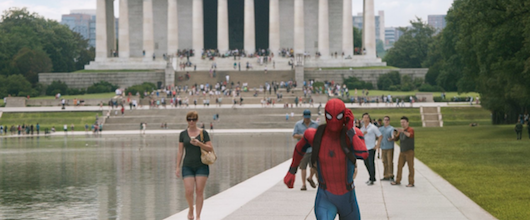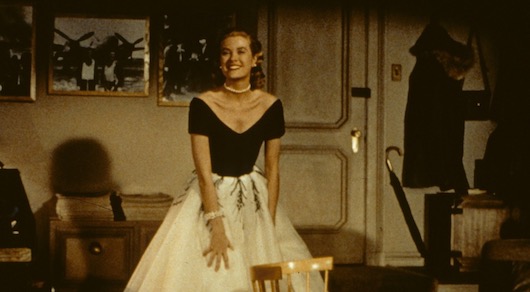
The Nitty Gritty
by CLAUDE CHABROL
Rear Window
dir. Alfred Hitchcock
112 minutes
 Whatever happens, I think the release of Rear Window will tend to create a united front in film criticism. Even the Anglo-Saxon critics themselves, who had shied away from some of Hitchcock's films for a while, regarded Rear Window with seriousness and sympathy. Indeed, right from its opening, Rear Window does present an immediate focus of interest that puts it on a higher plane than the majority of Hitchcock's earlier works, enough to warrant its entry into the category of serious films, beyond the mere entertainment thriller.
Whatever happens, I think the release of Rear Window will tend to create a united front in film criticism. Even the Anglo-Saxon critics themselves, who had shied away from some of Hitchcock's films for a while, regarded Rear Window with seriousness and sympathy. Indeed, right from its opening, Rear Window does present an immediate focus of interest that puts it on a higher plane than the majority of Hitchcock's earlier works, enough to warrant its entry into the category of serious films, beyond the mere entertainment thriller.
In fact, in this review, I do not want to concentrate on an element that is all too clear already: the culpability of the central character, a voyeur in the worst sense of the word. Rather I want to engage in drawing out certain elements that are less obvious, but even more interesting, which enrich the work with very specific resonances and make it possible to brush aside the objections and the criticisms that ensued after a superficial viewing of Rear Window at the last Venice Biennale.

In its first few minutes Rear Window presents us with an assembly of rabbit hutches, each of them completely separate and observed from another closed, incommunicable, rabbit hutch. From there it is obviously just a step, made with no difficulty, to the conclusion that the behaviour of the rabbits is, or should be, the object of attention, since in fact there is nothing to contradict this interpretation of the elements before us. We merely have to acknowledge that the study of this behavior is carried out by a rabbit essentially no different from the others. Which leads to the notion of a perpetual shift between the real behavior of the rabbits and the interpretation that the observer-rabbit gives of it, ultimately the only one communicated to us, since any break or choice in the continuity of this behavior, a continuity multiplied by the number of hutches observed, is imposed on us.
While the observer-rabbit is himself observed with a total objectivity, for example that of a camera which restricts itself to the observer's hutch, we are obliged to acknowledge that all the other hutches and all the rabbits in them are the sum of a multiple distortion produced from the hutch and by the rabbit which is objectively, or directly, presented.
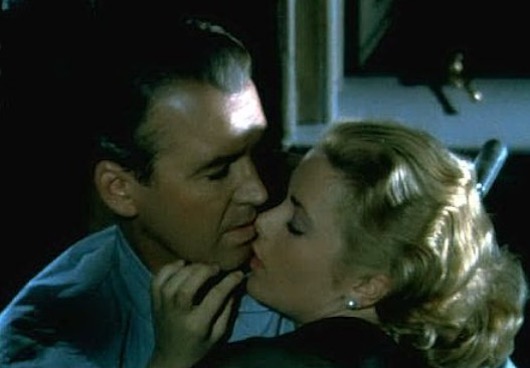
So in Rear Window the other side of the courtyard must be regarded as a multiple projection of James Stewart's amorous fixation.
The constitutive elements of this multiple projection are in fact a range of possible emotional relationships between two people of the opposite sex, from the absence of an emotional relationship, via the respective solitude of two people who are close neighbours, to a hate which ultimately turns to murder, by way of the sexual hunger of the first few days of love.
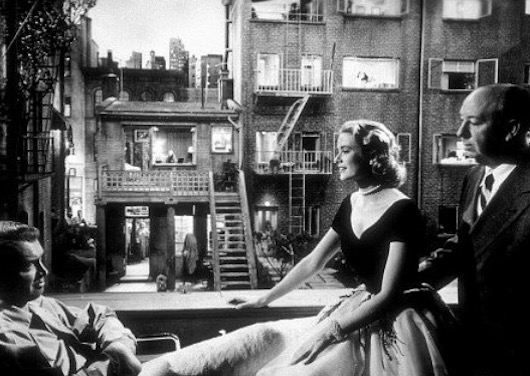
Once this is posited, another, essential element should be added: what might be called the position of the author, which, combined with the artistic factors imposed by the very nature of the enterprise, is developed through the characters directly presented and openly avowed by the strength of the evidence and the testimony of three biblical quotations, as Christian.
With these premises duly established, I leave to the reader the conclusion of that syllogism which definitively fixes the moral climate of the work, to pass on to what would properly be called its meaning.
The window which overlooks the courtyard consists of three sections, as stressed in the credit sequence. This trinity demands scrutiny. The work is in fact composed of three elements, three themes one could say, which are synchronized and in the end unified.

The first is a romantic plot, which by turns opposes and reunites James Stewart and Grace Kelly. Both are in search of an area of mutual understanding, for though each is in love with the other, their respective egos, only minimally divergent, constitute an obstacle.
The second theme is on the plane of the thriller. It is located on the other side of the courtyard, and consequently is of a rather complex, semi-obsessional character. Moreover it is very skillfully combined with a theme of indiscretion which runs through the whole work and confers on it a part of its unity. What is more, this thriller element presents all the stock characters of Hitchcock's earlier works, taken to their most extreme limits, since in the end one no longer knows whether the crime may not have been made a reality simply by Stewart's willing it.
The last theme reaches a complexity that cannot be defined in a single word: it is presented as a kind of realist painting of the courtyard, although 'realist' is a term that in the circumstances is a particularly bad choice, since the painting depicts beings which are, a priori, mental entities and projections. The aim is to illuminate, validate and affirm the fundamental conception of the work, its postulate: the egocentric structure of the world as it exists, a structure which the interlinking of themes seeks to represent faithfully. Thus the individual is the split atom, the couple is the molecule, the building is the body composed of X number of molecules, and itself split from the rest of the world.
The two external characters have the double role of intelligent confidants, one totally lucid, the other totally mechanized, and of witnesses themselves incriminated. Thus generalizing the exposé. Risking a musical comparison to illuminate the relationship between the themes, one might say that all three are composed with the same notes, but elaborated in a different order, and in different tonalities, each vying with the other and functioning in counterpoint. What is more, there is nothing presumptuous in such a comparison, since, within the rhythm of the work, it would be easy to determine four different constituent forms definable in musical jargon.
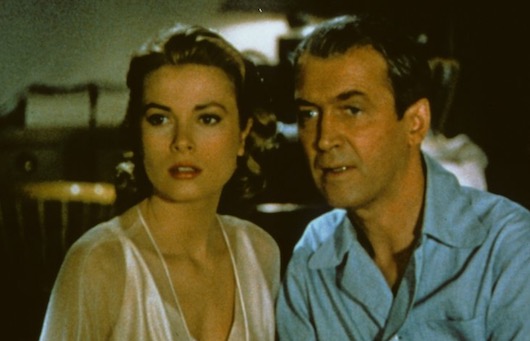
As one would expect in a work as structured as this one, there is in Rear Window a moment which crystallizes the themes into a single lesson, an enormous, perfect harmony: the death of the little dog. This sequence, the only one treated peripherally to the position of the narrator as articulated above (the only one where the camera goes into the courtyard without the presence of the hero), though grounded in an incident that in itself is relatively undramatic, is of a tragic and overwhelming intensity.
I can well understand how such vehemence and such gravity could seem rather inappropriate in the circumstances; a dog is only a dog and the death of a dog would seem an event whose tragic import bears no relation to the words spoken by the animal's owner. And these words themselves — 'You don't know the meaning of the word "neighbour"' — which encapsulate the film's moral significance, seem all too clumsy and too naive to justify such a solemn style. But the displacement itself is destroyed, for the tone leaves no room for doubt and gives things and feelings their real intensity and their invective: in reality this is the massacre of an innocent, and a mother who bemoans her child.
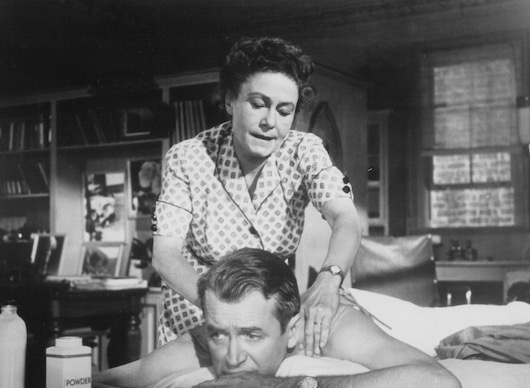
From then on the implications of this scene become vertiginous: responsibilities press upon one another at every imaginable level, to condemn a monstrously egocentric world, whose every element on every scale is immured in an ungodly solitude.
On the dramatic level, the scene presents the dual interest of a thriller plot development, aggravating suspicion, and an illustration of a theme dear to its author - the materialization of a criminal act that is indirectly willed (in this particular case, this death confirms Stewart's hopes).
From this point of view the confrontation scene between the murderer and the 'voyeur' is extremely interesting. The communication sought by the former — 'What do you want from me?' — whether blackmail or confession, involves the latter, who refuses from a recognition of its baseness, and in some way authenticates his responsibility. Stewart's refusal in this way illuminates the profound reason for the loneliness of the world, which is established as the absence of communication between human beings, in a word, the absence of love.

Other works of Hitchcock, like Rebecca, Under Capricorn or Notorious, have demonstrated the corollary of the problem: to know what the power of love can be. What is more, this aspect is not absent from Rear Window, where the embodiment of the Grace Kelly character draws her precious ambiguity from the opposition between her 'possible' and her 'being'. The possible is in fact the perceptible irradiation of her beauty and her charm, powerful enough to transform the oppressive and lonely atmosphere of the invalid's room into a flower garden with, in an unforgettable shot, James Stewart's head in repose.
Simultaneously, with her appearance on the scene comes the inexpressible poetry which is the love of two human beings: more than justified by the knowing coquetry of the author in the work's construction, this poetry brings into the stifling atmosphere of Rear Window, which is the atmosphere of the sewers themselves, a fleeting vision of our lost earthly paradise.
Since I don't want to go through the evidence yet again, I shall just leave it up to the spectator to appreciate the technical perfection of this film and the extraordinary quality of its colour.
Rear Window affords me the satisfaction of greeting the piteous blindness of the skeptics with a gentle and compassionate hilarity.
April 1955

 FILM
FILM  Monday, July 17, 2017 at 10:00AM
Monday, July 17, 2017 at 10:00AM 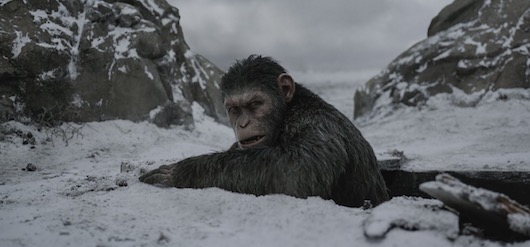
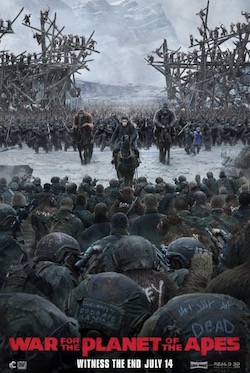 Bad things keep happening to apes. Even though only two living apes in War for the Planet of the Apes are actually able to speak English, the species still lives in deep nature, and their lifestyle is not in any way altered from when they were beasts, we are supposed to believe that these creatures have transcended some invisible line of sentience. The life of an ape is by far the most important thing in War for the Planet of the Apes, even though the apes seem to be killing just as many humans, if not more.
Bad things keep happening to apes. Even though only two living apes in War for the Planet of the Apes are actually able to speak English, the species still lives in deep nature, and their lifestyle is not in any way altered from when they were beasts, we are supposed to believe that these creatures have transcended some invisible line of sentience. The life of an ape is by far the most important thing in War for the Planet of the Apes, even though the apes seem to be killing just as many humans, if not more.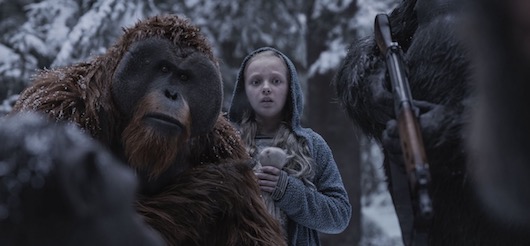
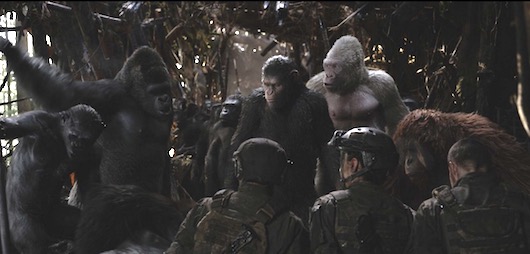
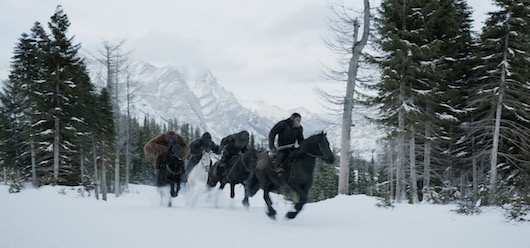
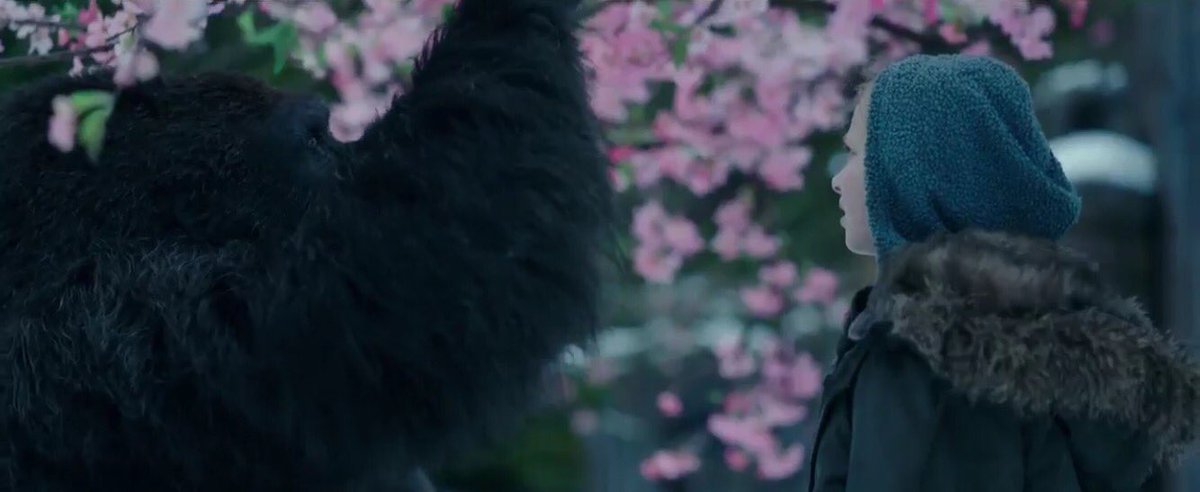
 alex carnevale,
alex carnevale,  andy serkis
andy serkis 







































